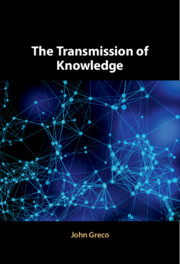Book contents
- The Transmission of Knowledge
- The Transmission of Knowledge
- Copyright page
- Contents
- Preface
- Acknowledgments
- 1 Introduction
- 2 The Framework Presented
- 3 Joint Agency and the Role of Trust in Testimonial Knowledge
- 4 Social Norms and Social Sensibilities
- 5 A Unified Account of Generation and Transmission
- 6 The Framework Extended
- 7 Education and the Transmission of Understanding
- 8 Reductionism and Big Science
- 9 Social Religious Epistemology
- Appendix: The Garbage Problem
- Bibliography
- Index
6 - The Framework Extended
Common Knowledge
Published online by Cambridge University Press: 21 August 2020
- The Transmission of Knowledge
- The Transmission of Knowledge
- Copyright page
- Contents
- Preface
- Acknowledgments
- 1 Introduction
- 2 The Framework Presented
- 3 Joint Agency and the Role of Trust in Testimonial Knowledge
- 4 Social Norms and Social Sensibilities
- 5 A Unified Account of Generation and Transmission
- 6 The Framework Extended
- 7 Education and the Transmission of Understanding
- 8 Reductionism and Big Science
- 9 Social Religious Epistemology
- Appendix: The Garbage Problem
- Bibliography
- Index
Summary
Chapter 6 extends the metaphor of a knowledge economy by considering the category of “common knowledge,” understood in the analogy to common or public property. The chapter then considers this idea in relation to Wittgenstein’s notion of hinge commitments, and in particular Wittgenstein’s observation that some of our most deeply held commitments are neither “a result of investigation” (and so, not from generation) nor something that is typically asserted (and so, not from transmission). The chapter also looks at the notion of procedural knowledge in cognitive psychology and artificial intelligence, and argues that many of the distinctive features that Wittgenstein attributes to hinge commitments are also characteristic features of procedural knowledge. In particular, procedural knowledge is tacit in both theoretical and practical reasoning, and in that sense drives perception, inference and action. This suggests a virtue-theoretic account of common knowledge, in terms of tacit knowledge that is constitutive of cognitive virtue. In this way, it is possible to preserve a unified account of generated knowledge, transmitted knowledge, and common knowledge.
Keywords
- Type
- Chapter
- Information
- The Transmission of Knowledge , pp. 103 - 125Publisher: Cambridge University PressPrint publication year: 2020

